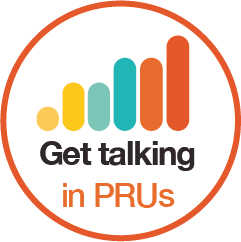A project supported by Nesta & Dulverton Trust

“Well why would anyone care what a kid from a PRU has to say anyhow?” (Student – ‘Get Talking in PRUs’)
Everyone should feel like their voice matters. Last year, Voice 21 worked with eleven Pupil Referral Units (PRUs) around the UK to learn more about how we can help support teachers working with young people who have been excluded from mainstream education, or who are at risk of exclusion.
Compared to their peers in mainstream education, young people in PRUs are “twice as likely to be in the care of the state, four times more likely to have grown up in poverty, seven times more likely to have a special educational need and ten times more likely to suffer recognised mental health problems” (IPPR: Making the Difference).
We wanted to make sure we supported PRUs in a way that worked for them, transferring what we have learned from working with more than 1100 mostly mainstream schools since 2017, and recognising and adapting to any differences brought about by the PRUs’ context. To do this, we were supported by Nesta and the Dulverton Trust to deliver a year of support to eleven PRUs, alongside an evaluation (supported by Nesta’s evaluation partner, the University of Sussex) that would help us to learn what we were doing well, how we could improve, and what they outcomes of our support are for teachers and students in PRUs.
Here are some of our reflections:
We found lots of ways in which our work in mainstream schools was similar to working with PRUs. It was just as important to be responsive to the school’s context, to support teachers in making meaningful changes to teaching and learning rather than promising ‘quick fixes’ and to value and build on school staff’s existing areas of expertise.
Where we found differences in context, we worked with PRU staff to develop PRU-specific oracy strategies and adaptations that meet their needs. We recognise that it’s important for staff in PRUs to be able to connect with others sharing similar challenges, and are committed to supporting the community of oracy-focused PRUs in the UK as it grows.
The PRU context highlighted the role that oracy plays in building relationships – whether between students and their peers, or students and staff. PRUs reported that a focus on oracy improved students’ ability to regulate their emotions and equipped students with the tools they needed to discuss issues that concerned them – this in turn improved relationships within the settings.
We also heard that improvements in oracy boosted student autonomy. Improved oracy and emotional regulation meant that students were more often able to make positive choices when working or playing with others. One PRU reported that this enabled them to re-think play times for younger students in a way that would further enhance their capacity for self-regulation, empathy and cooperation:
“Before we’d have really really structured play, which helped them with their behaviour because obviously most of them are with us because of their behaviour. What we’ve been able to do is kind of loosen that to allow them to have their own time, and they’re now role-playing more like they were playing cops and robbers, and they’d got the Jenga blocks and they were using that as money, things like that – they would never have role-played before but they’re now able to.” (Oracy Lead – ‘Get Talking in PRUs’)
Voice 21 has always been committed to evaluating our approach with schools. We take the trust schools place in us seriously, and therefore seek to improve continually through a focus on understanding our impact. The ‘Get Talking in PRUs’ project permitted us to work with Nesta’s evaluation partner, the University of Sussex, to design a mixed-methods evaluation approach to explore the impact of oracy on students’ social/emotional competence and perceptions of self.
Whilst aspects of the evaluation approach were disrupted by Covid-19, we learnt that an evaluation approach that combines both quantitative and qualitative elements is an insightful way to explore the effects of our work with schools. We recognise that schools, teachers and students are all complex in their own ways – and so a simple ‘cause and effect’ can be difficult to isolate. Mixed-methods gave us insight into this complexity, and we have incorporated our learning from this project into our ‘everyday’ evaluation approaches.
We are very grateful to Nesta, The Dulverton Trust and all the staff and students involved in ‘Get Talking in PRUs’, without whom this project would not have been possible.
© 2022 Voice 21. Voice 21 is a registered charity in England and Wales. Charity number 1152672 | Company no. 08165798